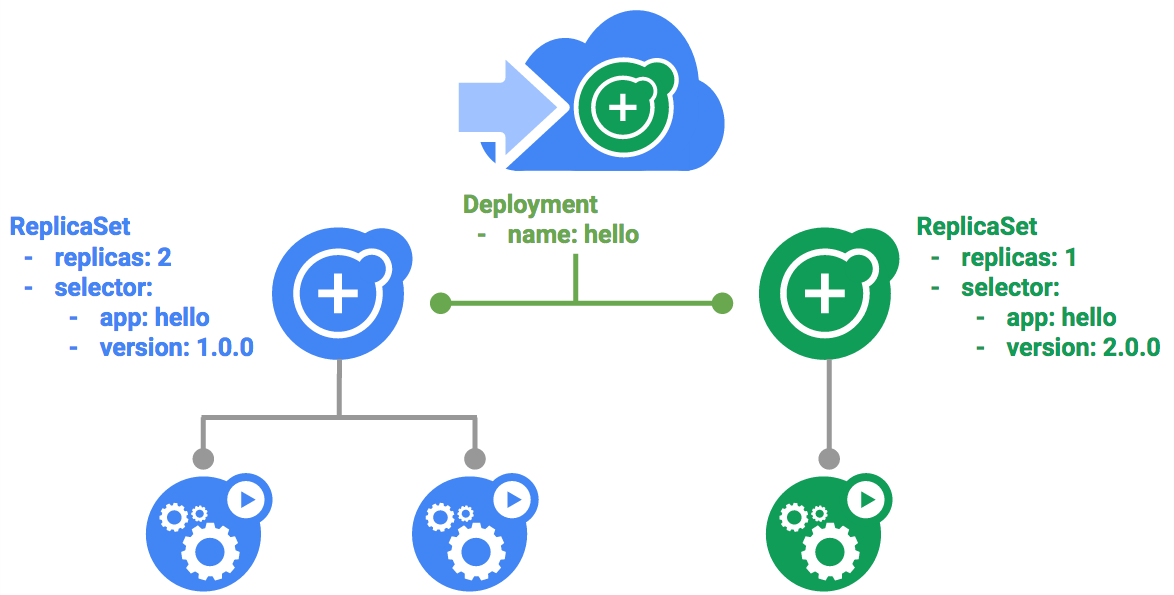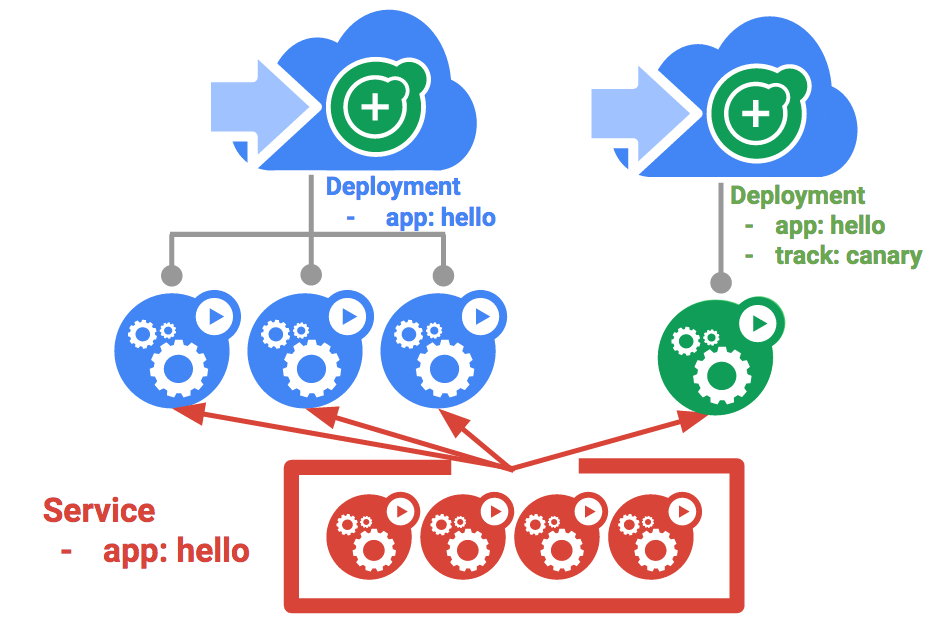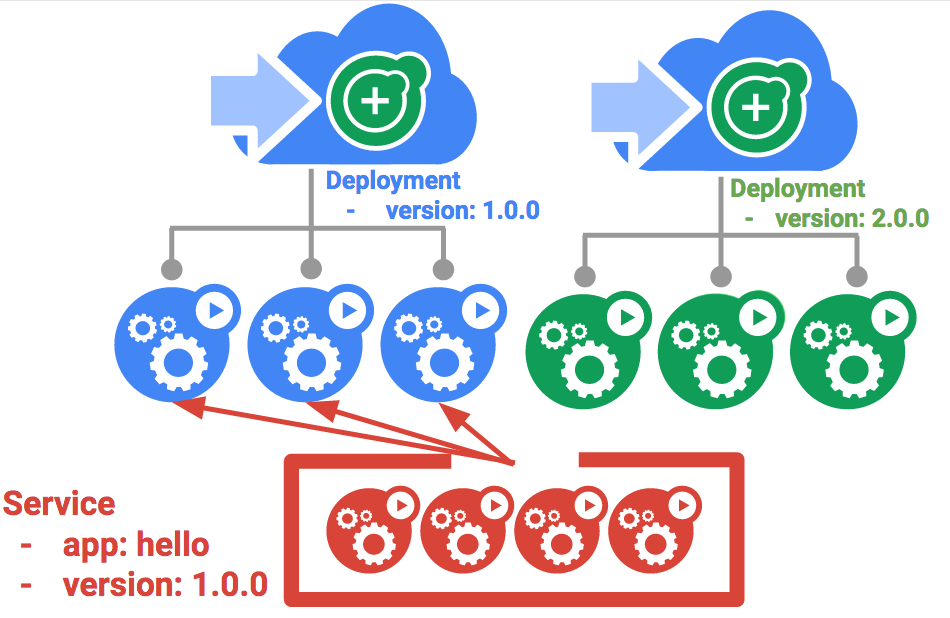| 일 | 월 | 화 | 수 | 목 | 금 | 토 |
|---|---|---|---|---|---|---|
| 1 | 2 | 3 | 4 | 5 | ||
| 6 | 7 | 8 | 9 | 10 | 11 | 12 |
| 13 | 14 | 15 | 16 | 17 | 18 | 19 |
| 20 | 21 | 22 | 23 | 24 | 25 | 26 |
| 27 | 28 | 29 | 30 | 31 |
- 파이썬
- schema first
- 자료구조
- c++
- 엣지컴퓨팅
- Cloud Spanner
- 스플릿키보드
- 레이캐스팅
- 어셈블리
- 프라이빗클라우드
- 창업
- mistel키보드
- raycasting
- 스타트업
- GraphQL
- 텍스트북
- adminbro
- 이노베이션아카데미
- 도커
- 쿠버네티스
- 정렬
- 어셈블리어
- 42서울
- 부동소수점
- 동료학습
- 42seoul
- SFINAE
- enable_if
- psql extension
- uuid-ossp
- Today
- Total
written by yechoi
[쿠버네티스] 배포 전략 본문
deployment
- 배포전략 - rolling, blue/green, canary
Heterogeneous deployments typically involve connecting two or more distinct infrastructure environments or regions to address a specific technical or operational need. Heterogeneous deployments are called "hybrid", "multi-cloud", or "public-private", depending upon the specifics of the deployment.
Three common scenarios for heterogeneous deployment are multi-cloud deployments, fronting on-premises data, and continuous integration/continuous delivery (CI/CD) processes.
gcloud container clusters create cluster_name --scope student_02_e97cc3dab6fc@cloudshell:~/orchestrate-with-kubernetes/kubernetes (qwiklabs-gcp-03-8d2294ec9eec)$ kubectl explain deployment
KIND: Deployment
VERSION: apps/v1
DESCRIPTION:
Deployment enables declarative updates for Pods and ReplicaSets.
FIELDS:
apiVersion <string>
APIVersion defines the versioned schema of this representation of an
object. Servers should convert recognized schemas to the latest internal
value, and may reject unrecognized values. More info:
https://git.k8s.io/community/contributors/devel/sig-architecture/api-conventions.md#resources
kind <string>
Kind is a string value representing the REST resource this object
represents. Servers may infer this from the endpoint the client submits
requests to. Cannot be updated. In CamelCase. More info:
https://git.k8s.io/community/contributors/devel/sig-architecture/api-conventions.md#types-kinds
metadata <Object>
Standard object metadata.
spec <Object>
Specification of the desired behavior of the Deployment.
status <Object>
Most recently observed status of the Deployment.curl -ks https://`kubectl get svc frontend -o=jsonpath="{.status.loadBalancer.ingress[0].ip}"`
===
curl -ks https://EXTERNAL_IPdeployment scale 하기
kubectl scale deployment hello --replicas=5Rolling update
Deployments support updating images to a new version through a rolling update mechanism. When a Deployment is updated with a new version, it creates a new ReplicaSet and slowly increases the number of replicas in the new ReplicaSet as it decreases the replicas in the old ReplicaSet.
kubectl rollout
rollback an update
Use the rollout command to roll back to the previous version:
kubectl rollout undo deployment/helloCanary deployments
When you want to test a new deployment in production with a subset of your users, use a canary deployment. Canary deployments allow you to release a change to a small subset of your users to mitigate risk associated with new releases.
Create a canary deployment
A canary deployment consists of a separate deployment with your new version and a service that targets both your normal, stable deployment as well as your canary deployment.
session affinity
서비스가 Pod들에 부하를 분산할때 디폴트 알고리즘은 Pod 간에 랜덤으로 부하를 분산하도록 한다.
만약에 특정 클라이언트가 특정 Pod로 지속적으로 연결이 되게 하려면 Session Affinity를 사용하면 되는데, 서비스의 spec 부분에 sessionAffinity: ClientIP로 주면 된다.
출처: https://bcho.tistory.com/1262 [조대협의 블로그]
Blue-green deployments
Rolling updates are ideal because they allow you to deploy an application slowly with minimal overhead, minimal performance impact, and minimal downtime. There are instances where it is beneficial to modify the load balancers to point to that new version only after it has been fully deployed. In this case, blue-green deployments are the way to go.
Blue/Green 배포는 구 버전에서 새 버전으로 일제히 전환하는 전략이다. 구 버전의 서버와 새 버전의 서버들을 동시에 나란히 구성하고 배포 시점이 되면 트래픽을 일제히 전환시킨다. 하나의 버전만 프로덕션 되므로 버전 관리 문제를 방지할 수 있고, 또한 빠른 롤백이 가능하다. 또 다른 장점으로 운영 환경에 영향을 주지 않고 실제 서비스 환경으로 새 버전 테스트가 가능하다. 예를 들어 구 버전과 새 버전을 모두 구성하고 포트를 다르게 주거나 내부 트래픽일 경우 새 버전으로 접근하도록 설정하여 테스트를 진행해 볼 수 있다. 단, 시스템 자원이 두 배로 필요하고, 전체 플랫폼에 대한 테스트가 진행 되어야 한다.
- 디플로이먼트를 만든다
kubectl create -f deployments/hello-green.yaml- 디플로이먼트를 적용한다
kubectl apply -f services/hello-green.yaml- 롤백하고 싶다면 이전 디플로이먼트를 적용한다
kubectl apply -f services/hello-blue.yaml







